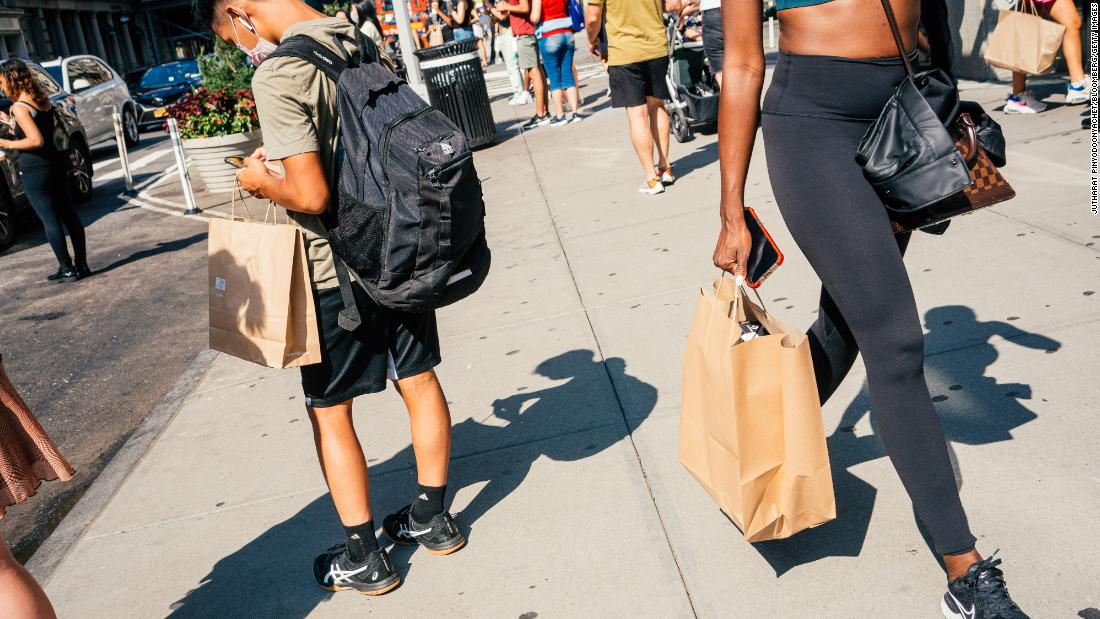That was the take from Ian Shepherdson, chief economist at Pantheon Macroeconomics, after seeing the data on US retail sales for August.
“We see only very modest evidence that the spread of the Delta variant is having an impact on demand,” Citi’s Veronica Clark and Andrew Hollenhorst said in a note to clients.
Another signal: There were 332,000 initial jobless claims in the United States last week. That’s only a slight uptick from the week prior, when claims hit a pandemic low.
The four-week moving average has now dropped to 335,800 claims, its best level in the Covid-19 era, according to Jim Reid of Deutsche Bank.
That’s not to say the Delta variant isn’t having any impact. Seatings at restaurants in the United States appear to have dropped sharply in recent days, according to
data from OpenTable.
On the radar: In August, spending at restaurants was flat month-over-month. Grocery store spending also climbed 1.8%, suggesting that Americans were opting to dine more at home again.
And we can’t forget the jarring US jobs report for August, when just 235,000 positions were added. Restaurants and bars registered a loss of 42,000 jobs.
Big picture: The data is promising, but also messy. Rising prices due to inflation could be contributing to higher retail sales, muddying the picture. Plus, there’s a huge element of uncertainty about the economic trajectory as colder weather sets in. The Federal Reserve, which meets next week, doesn’t have an easy job charting the path forward.
For the time being, many are choosing to look on the bright side. New variants may weigh on the economic recovery, but could be far less damaging than early in the pandemic, as vaccinations help consumers feel more confident and allow governments to avoid reimposing strict rules.
“You’ll see more resilience with each wave,” Jeffrey Sacks, head of investment strategy for Europe, the Middle East and Africa at Citi Private Bank, predicted earlier this week.
Wall Street is unfazed by China’s potential ‘Lehman moment’
The implosion of Lehman Brothers 13 years ago this week showed how the collapse of a single business can send shockwaves around the world.
Now, more than a decade later, policymakers and investors in the United States are watching closely as a massive property developer thousands of miles away teeters on the brink of default, my CNN Business colleague Matt Egan reports.
Catch up: The risk is that the collapse of Evergrande, a Chinese real estate company with a staggering $300 billion of debt outstanding, could set off a chain reaction that spreads overseas.
“Some fear an Evergrande meltdown will have systemic risks on par with the impact Lehman Brothers’ demise had on the US stock market,” Ed Yardeni, president of Yardeni Research, wrote in a note to clients Thursday.
Like Lehman in its heyday, Evergrande is massive. It’s one of the world’s biggest businesses by revenue, and employs about 200,000 people.
But for now, investors are confident that authorities in Beijing would use their vast control over the Chinese economy to limit the damage. So far, there’s no evidence of contagion in US markets.
“I don’t think the Evergrande meltdown, and the financial problems of Chinese property companies more broadly, will reverberate back on the US economy,” Mark Zandi, chief economist at Moody’s Analytics, told CNN Business.
Not alone: “We think that the ‘China’s Lehman moment’ narrative is wide of the mark,” Simon MacAdam, senior global economist at Capital Economics, wrote in a note on Thursday. MacAdam said even a “messy collapse” of Evergrande would have “little global impact beyond some market turbulence.”
Only time will tell, however, how systemically important the company really is — and what Beijing may do to cushion the blow.
These were the week’s hottest IPOs
Companies that made their public market debuts in the United States this week are generating tons of hype, benefiting from investor enthusiasm for new stocks in industries ranging from software to athletic wear.
The highlights: ForgeRock, a San Francisco-based company that makes identity verification software, hauled in $275 million through its stock sale. Its shares also enjoyed a huge pop in their first day of trading on the New York Stock Exchange, jumping 46% on Thursday.
Stock in Swiss sportswear brand On, which is backed by tennis superstar Roger Federer, has surged 56% above the company’s initial public offering price since Wednesday.
And Thoughtworks, a tech consultancy, has seen its stock on the Nasdaq jump almost 50% in its first two days of trading.
Bloomberg calculates that IPOs on US exchanges — excluding special-purpose acquisition companies, or SPACS — raised almost $4.4 billion this week.
Step back: Buzzy IPOs have generated mixed returns this year. The Renaissance IPO exchange-traded fund, which tracks the biggest newly-listed public companies in the United States, is up just 7.3% year-to-date, compared to a 19.1% rise in the S&P 500. Its top holdings include Snowflake, Palantir, Datadog and Coinbase.
But newer stocks have started to perform better in recent months. The Renaissance IPO ETF has climbed 4.6% in the third quarter, versus a 4.1% increase in the S&P 500.
Up next
Manchester United (MANU) reports results before US markets open.
Also today: The University of Michigan’s survey of consumer sentiment posts at 10 a.m. ET.
Coming next week: The Federal Reserve holds a policy meeting as investors scrutinize the central bank’s next steps.


























